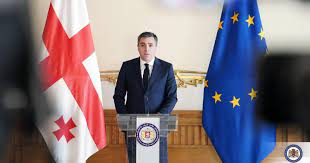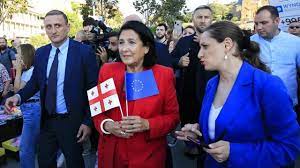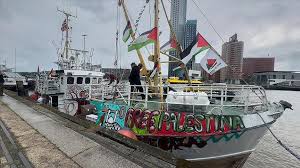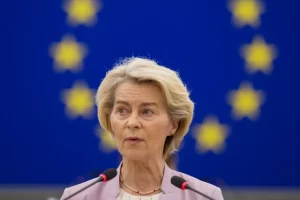Positive signals from Brussels reignite Georgians’ EU hopes

Brussels: Georgians were uplifted by an ambitious enlargement speech by an EU leader a week after another enlargement-related meeting left the country worried about its future in the bloc.
On August 28, European Council President Charles Michel delivered a bold address speaking of countries with a “European perspective” – including Georgia – as “future member states,” and laying out a more detailed plan for their integration.
The speech came as overwhelmingly pro-EU Georgia was left feeling excluded from a Greek-hosted enlargement-related forum closely preceding it.
“I believe we must be ready – on both sides – to enlarge by 2030,” Michel said during his address at the Bled Strategic Forum in Slovenia. “This is ambitious, but necessary. It shows that we are serious. It will build momentum.”

The European leader went on to talk about plans for “progressive integration” of these countries into specific EU policy areas so that they feel the benefits even before their actual membership.
“EU leaders will discuss enlargement at our next European Council meetings. We will take a stand on the opening of negotiations with Ukraine and Moldova. And I also expect Bosnia and Herzegovina and Georgia to be back on the table,” Michel said.
Georgia, along with Ukraine and Moldova, applied formally for membership in the wake of the Russian full-scale invasion of Ukraine last year. And the country has been on a rollercoaster ride since.
The latter two were given candidate status immediately while Tbilisi was given a “European perspective” and told to come back after addressing twelve reform priorities. The initial failure was widely attributed to political polarization and democratic problems in the country, while the ruling Georgian Dream party blamed it largely on the EU’s geographic and geopolitical considerations.
The European Commission, the EU’s executive arm, will reassess Georgia’s progress in October. The country will need a green light from all member states to progress to the next stage, which is official candidacy.

In the meantime, fears of suffering another failure on the path to the EU candidacy have haunted Georgia’s ever-turbulent political process. Those concerns played a key role in the public mobilization against the ruling party-sponsored “foreign agent bills” in March and added to pressure on the government to pass due reforms – or at least not make things worse.
In its interim oral update in June, the European Commission said that three out of twelve priorities were completely addressed, seven saw “some progress”, there was “limited progress” on one more priority, and one more was without progress.
(That last one concerned media freedom, which was to some extent addressed when Georgian President Salome Zourabichvili pardoned Nika Gvaramia, a jailed media personality, soon after the update.)
And in recent months, rather promising rumors have been coming from Brussels about Georgia likely succeeding on the second try.
Until a forum that was held in Athens on August 21-22 led many to question those rumors.
The Greek-hosted meeting that focused on enlargement had EU leaders, some member states, as well as membership aspirants including Ukraine and Moldova among its guests. Georgia, on the other hand, was not invited.
The joint declaration of the meeting participants seemed to imply geographical factors behind the absence of more remote Georgia. The document described the counties on the guest list, including the Western Balkans, Ukraine, and Moldova, as being “geographically adjacent to EU Member States” with “a common European heritage, history and a future defined by shared opportunities and challenges.”
RFE/RL’s Rikard Jozwiak, on the other hand, quoted one EU diplomat as saying the countries invited “appear to be the most advanced” on their EU membership paths. The journalist further suggested that the absence of Georgia and Turkey (a candidate since 1999), might imply that they are the ones to be left out of eventual membership due to the limits of the bloc’s “absorption capacity”.
According to Georgian online news outlet Civil.ge, the Georgian foreign ministry was planning to summon the Greek ambassador for clarifications regarding Georgia’s not being invited to the forum.
Against this backdrop, Michel’s remarks this week revived fading hopes in Georgia – at least among government critics.
The remarks show that “everyone in the democratic world has agreed: Georgia’s place is in the EU,” Davit Usupashvili, an MP from the opposition Lelo for Georgia party, told reporters on August 29. “The only one who doubts and opposes it is the confused Georgian Dream.”
Ruling party leaders, on the other hand, were more cautious in assessing Michel’s speech, asking for more clarity.
“This statement was a bit general and one wonders whom 2030 [enlargement] will concern,” Georgian Dream Chairman Irakli Kobakhidze told journalists on August 29. To prove his point Kobakhidze cited the examples of other candidate countries (likely those of the Western Balkans) who have been on the waiting list for over a decade.
The chairman, however, argued that Georgia had done its EU homework and should therefore have “grounds for optimism given that everything is ready for getting candidate status.”
The tense anticipation of the candidacy decision also led to a renewed spat between the government and President Zourabichvili. Zourabichvili, a figurehead leader increasingly estranged from the ruling party and critical of its policies, has tried to do her part in advocating for a positive candidacy decision for Georgia.
Yet the government stated on August 30 that it had declined Zourabichvili’s request for multiple visits to European capitals for that purpose.
As the reason behind declined requests, the government administration cited provisions from the Georgian constitution that put the government as the supreme body to implement the foreign policy of the country.





